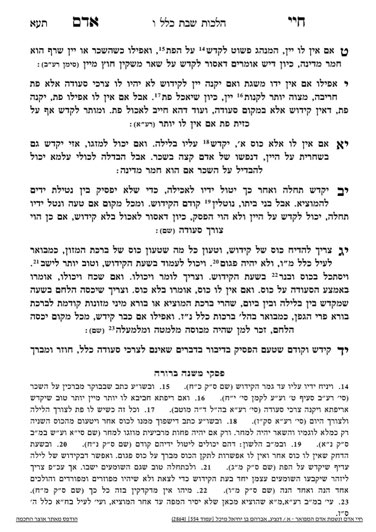The current series, which will cover Maariv on Friday night and Kiddush, is available for sponsorship. Please contact Rabbi Reingold for more information.
We are beginning siman 12, where the Chayei Adam discusses the proper order of kiddush. The Chayei Adam writes that kiddush should be b’makom seudah, as close as possible both in proximity and in time to the seudah. If a person makes kiddush at home but then takes an hour to schmooze before eating the meal, it is in the place (mokom) of the seudah but is not at the time of the seudah.
The Chayei Adam writes that besides for the baal habayis, who is reciting kiddush, others should wash before hamotzi in order to minimize the interruption between kiddush and hamotzi. On the other hand, the baal habayis should lechatchilla say kiddush and then wash his hands, in order to minimize the interruption between netilas yadayim and hamotzi. It is not a hefsek for the family members to hear kiddush, since it is part of the needs of the meal.
The Shulchan Aruch explains that it is incorrect to think that one cannot talk at that time, between netilas yadayim and hamotzi. Rather, one cannot have a hesech hadaas from the seudah, and once they have washed their hands, they must remain clean. Once a person has begun their seudah, there is a subconscious protection of the hands because they are needed for eating. But, we are concerned about something which may occur between washing and eating, where a person may get distracted. Nevertheless, meikar hadin, it is incorrect that one cannot speak during this time. Only if one gets distracted enough that they have a hesech hadaas on their hand-washing, they would have to re-wash.
Thus, listening to kiddush after having washed is not a problem, because it is a need of the seudah. The Mishnah Berurah adds that lechatchilla it is appropriate to drink from the kos bracha.
If the person making kiddush mistakenly washes his hands before kiddush, he can still make kiddush in between washing and hamotzi. However, the Chayei Adam holds that lechatchilla the person making kiddush one should not wash before the seudah.
Some people follow the practice of the Chayei Adam, and others have everyone–including the person making kiddush–wash their hands before kiddush.
Telshe Yeshiva did as the Chayei Adam recommended, and had everyone wash before kiddush other than the person making kiddush.
Summary
- Kiddush should be bemakom seudah, both in proximity and in time.
- The Chayei Adam holds that everyone should wash before kiddush, besides for the person reciting kiddush.



